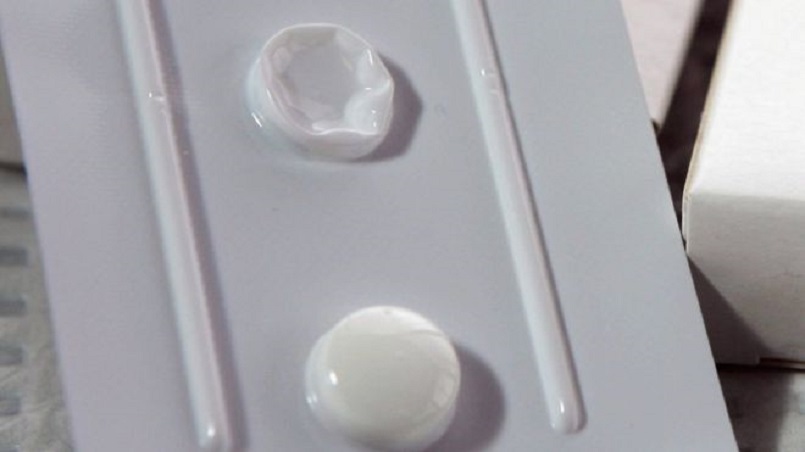
A woman was reported to police in Northern Ireland and charged in connection with using abortion pills after she sought medical help, the BBC has learnt.
The purchase and use of abortion pills is illegal throughout the UK.
However, there is particular concern about their availability in Northern Ireland.
This is because a termination is only allowed where a woman's life or long-term health is put at serious risk.
There are now warnings that women are putting their health at risk by taking abortion pills bought online.
The drugs cause blood loss and some people are likely to need treatment if they use them.
Women in England, Scotland and Wales are allowed to have an abortion within the first 24 weeks of their pregnancy if it is carried out in a hospital or a licensed clinic.
In recent months campaigners have staged a series of stunts - including swallowing abortion pills in front of the police - as part of their attempts to challenge the stricter laws in Northern Ireland.
"It's a class issue now," said Courtney Robinson of Socialist Youth NI, who spoke to me at a protest outside Newry.
"Those who can afford it are travelling to England and having an abortion there privately.
"And those who can't afford it are here to either be in a dangerous situation or to get these pills online and face criminalisation."
There are fears that many who order pharmaceuticals online cannot be sure what they will receive.
BBC News NI looked at numerous websites that advertise abortion pills and offer to deliver them to UK addresses.
Risk of heavy bleeding
I purchased pills which arrived from India with limited documentation and had them tested at Queen's University in Belfast.
The university's ASSET Technology Centre found the drugs were capable of causing a termination however the pills were not licensed for use in the UK.
"There are risks associated with this drug's use," said Dr Paul McCague of the School of Pharmacy at Queen's.
"Of particular concern with this drug would be the heavy bleeding which is a relatively common adverse effect.
"And a number of women will actually require a blood transfusion."
A number of people have been charged in connection with the use and purchase of abortion pills over the last few years.
It is understood that one of those women was reported to police after she requested medical help.
A police statement said: "The PSNI has a statutory duty under Section 32 of the Police (NI) Act 2000 to protect life, to prevent the commission of offences and where an offence has been committed, to take measures to bring the offender to justice.
"As with any other offence where there are grounds to suspect the commission of an offence we will conduct a thorough and objective investigation into the matter.
"Whilst police can make recommendations at the conclusion of their investigation ultimately it will be a matter for the Public Prosecution Service to determine whether the case should or should not be prosecuted."
The Department of Health in Northern Ireland issued guidelines earlier this year stating that medical staff had a legal responsibility to give the police information to secure "the apprehension, prosecution, or conviction" of anyone involved in an illegal termination.
That duty to make a report to police is contained in the Criminal Law Act (NI) 1967.
'Don't ask, don't tell'
However the guidance from Stormont goes on to say that all staff's first duty is the care of the woman and that health professionals do not need to pass on information "if they have a reasonable excuse for not doing so".
It has been described by some as a "don't ask, don't tell" clause.
The issue of abortion remains extremely divisive at Stormont, where there are some politicians who want the law in Northern Ireland relaxed to allow terminations in cases where the baby will not survive beyond birth.
However there are many MLAs with deeply-held religious beliefs who oppose any new legislation.
"We have been looking to the rest of the UK and saying we don't want that to happen," said Marion Woods of the anti-abortion group LIFE NI.
"And our politicians have been holding against the tide of some people who are actively trying to quite forcefully change our law."
BBC News NI tried to speak to both Stormont's justice and health ministers about abortion pills, but both refused several requests.
And when I turned up at a charity event where the Justice Minister Claire Sugden was due to give interviews, I was told I would not be allowed to ask her about abortion.
When I refused to agree to that, Ms Sugden's press officer asked for the charity hosting the event to throw us out.
Health Minister 'unavailable'
The Department of Justice issued a short statement, saying issues regarding prosecution on abortion were a matter for the PPS (Public Prosecution Service).
"The current law prohibits the use of abortion drugs throughout the UK," it said.
"Medical issues relating to the use of abortion pills are a matter for the Department of Health."
After several calls a spokesman for that department simply said the health minister was "unavailable for interview".
